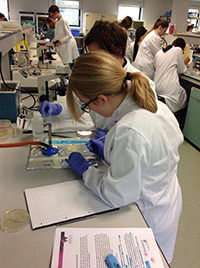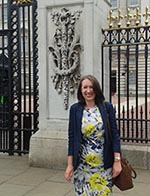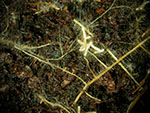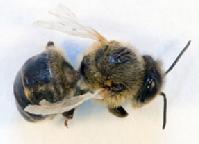Life Sciences News
See our Latest Journal Publications
GARNish newsletter puts spotlight on plant science at Warwick
 The latest GARNish newsletter highlights plant science in Life Sciences, profiling the work of our academics.
The latest GARNish newsletter highlights plant science in Life Sciences, profiling the work of our academics.
'Plant science research at the University of Warwick is characterised by the breadth of expertise - from fundamental molecular mechanisms to projects with direct application to industry. We have world-class basic science in signalling, gene regulation, development, plant– environment (microbes, virus, soil) interactions, and evolution through to pest management, crop genetics and genomics underpinning the development of new varieties.'
Read the newsletter (pdf)
Warwick welcomes the next generation of scientists
 This week the School of Life Sciences welcomes the next generation of scientists from across the United Kingdom as part of a Headstart Summer School.
This week the School of Life Sciences welcomes the next generation of scientists from across the United Kingdom as part of a Headstart Summer School.
Taking place between the 19-23 July at the University’s Gibbet Hill campus, the Headstart Life Sciences course will provided the 17 year olds the opportunity to explore different biological disciplines taught within the School of Life Sciences and introduce them to a flavour of the academic side of undergraduate life.
Dr Liz Fullam discusses TB research at Buckingham Palace
 On 23rd June, Dr Liz Fullam was invited to Buckingham Palace for afternoon tea as a Sir Henry Dale fellow. The event, organised by the Royal Society, enabled newly appointed fellows to meet with his Royal Highness the Duke of York. HRH kindly hosted the event, giving him the opportunity to find out more about the research of some of our best young scientists. Liz met HRH and spoke about her work on tuberculosis (TB) and the importance of finding new drugs and diagnostics for this disease.
On 23rd June, Dr Liz Fullam was invited to Buckingham Palace for afternoon tea as a Sir Henry Dale fellow. The event, organised by the Royal Society, enabled newly appointed fellows to meet with his Royal Highness the Duke of York. HRH kindly hosted the event, giving him the opportunity to find out more about the research of some of our best young scientists. Liz met HRH and spoke about her work on tuberculosis (TB) and the importance of finding new drugs and diagnostics for this disease.
Changing perceptions of Britain from the Mesolithic to Neolithic age
 The Mesolithic-to-Neolithic transition marked a profound change in human society as a hunter-gatherer economy gave way to agriculture and the development of complex societies. In Northern Europe, this coincided with rising sea levels which cut Britain off from the continental mainland.
The Mesolithic-to-Neolithic transition marked a profound change in human society as a hunter-gatherer economy gave way to agriculture and the development of complex societies. In Northern Europe, this coincided with rising sea levels which cut Britain off from the continental mainland.
Professor Robin Allaby explains his new research which challenges the traditional evaluation of the development of early British man.
An interview with Virologist Prof David Evans: What do we know about Ebola?
 The Ebola outbreak in West Africa has rapidly become the deadliest since the discovery of the virus. But what do we really know about this deadly disease? Ahead of his Cheltenham Science Festival lecture at the Winton Crucible on Thursday 4th June, Virologist Professor David Evans explores a little of the history and biology of Ebola.
The Ebola outbreak in West Africa has rapidly become the deadliest since the discovery of the virus. But what do we really know about this deadly disease? Ahead of his Cheltenham Science Festival lecture at the Winton Crucible on Thursday 4th June, Virologist Professor David Evans explores a little of the history and biology of Ebola.
Researchers have been awarded over £1.3m to research food security
Researchers from the University of Warwick’s School of Life Sciences (SLS) have been awarded over £1.36m in grants to further their work into food security.
The BBSRC Horticulture and Potato Initiative (HAPI) grants include substantial cash and in-kind contributions from industrial partners and will be used to support work into how to improve pest and disease control and post-harvest quality.
Commenting on the grants Professor Laura Green, Head of SLS, said:
“The BBSRC HAPI grants will help ensure that the University of Warwick’s School Life Sciences continues to play a leading role in improving food production globally. The Warwick HAPI-funded projects will result in substantial impacts on the horticulture industry by translating research findings into solutions that benefit several stages in the food supply chain, including farmers, processors and retailers.”
Researchers secure £3.19m boost to tackle superbugs
Life Sciences researchers have been awarded £3.19m in funding to support a flagship project into antimicrobial resistance (AMR).
The funding will enable multi-partner collaborations in order to tackle the growing threat of superbugs as part of a co-ordinated multi-disciplinary effort to fight their prevalence.
Awarded by a cross research council ‘war cabinet’ on AMR comprising the Medical Research Council (MRC) and the Biological Sciences Research Council (BBSRC), the funding marks one of the largest UK public grant investments in AMR research.
Researchers Prof Chris Dowson, Dr David Roper, Dr Adrian Lloyd from the School of Life Sciences and Prof Matthew Turner of the Department of Physics, will investigate a vital link in the chain of antimicrobial resistance – the bacterial cell wall. The main component of the wall is called peptidoglycan, which is the key target of penicillin and other similar antibiotics.
Twelve things you probably won’t know about your Christmas dinner
Most of us won’t think twice about the scientific make-up of our Christmas dinner but there’s more to that plate of festive food than meets the eye!
To celebrate being ranked second in the UK for Agriculture, Food and Veterinary research this week, Dr Graham Teakle and Dr Charlotte Allender from the School of Life Sciences are sharing their vast vegetable knowledge in a bid to help families truly appreciate this year’s festive feast.
School of Life Sciences ranked second in UK for Agriculture, Food and Veterinary research
The School of Life Sciences has been ranked second in the UK for Agriculture, Food and Veterinary research in the Government's 2014 research ranking exercise. Overall more than 80% of life sciences research was rated as 'World Leading or Internationally Excellent'.
The ranking exercise known as the 'Research Excellence Framework (REF)' is run by the UK’s higher education funding bodies, to assess the quality of UK research and to inform the distribution of public funds for research until the next ranking exercise in 2020.
The University of Warwick was ranked as the 7th highest university.
To find out more visit www.warwick.ac.uk/research/excellence
What is Synthetic Biology?
Warwick Centre for Integrative Synthetic Biology (WISB) researchers Orkun Soyer and Declan Bates feature in a short video called ‘What is Synthetic Biology?’. The video, which was commissioned by the venture capital fund the Rainbow Seed Fund, highlights the field’s potential as a significant driver for UK business.
Getting agricultural information to smallholder farmers can help improve food security
BBSRC-funded PhD student Andrew Tock, from Warwick Crop Centre, explores 'plant clinics' in Uganda where farmers can receive objective and impartial advice on how to best treat their crops to protect them from pests. The diary is based on a three-month project in Uganda, and part of the Midlands Integrative Biosciences Training Partnership (MIBTP), a BBSRC-funded Doctoral Training Partnership. Find out more in Andy's blog.
Video courtesy of BBSRC
Scientists benefit from funding initiatives to protect soils and safeguard global food security
 The School of Life Sciences will lead one of four projects, with combined funding of £5 million, supported by a BBSRC led initiative known as SARISA (Soils and Rhizosphere Interactions for Sustainable Agri-ecosystems). SARISA was developed with NERC under the Global Food Security (GFS) programme. Researchers will investigate the factors affecting soil microbial communities and the consequences for crop growth.
The School of Life Sciences will lead one of four projects, with combined funding of £5 million, supported by a BBSRC led initiative known as SARISA (Soils and Rhizosphere Interactions for Sustainable Agri-ecosystems). SARISA was developed with NERC under the Global Food Security (GFS) programme. Researchers will investigate the factors affecting soil microbial communities and the consequences for crop growth.
Soil is fundamental to our life support system, providing food, storing and filtering water, cycling nutrients and providing a habitat for many species. It is at the heart of our interaction with the environment and central to the responsible management of our planet. The world will need to produce 50% more food by 2030 to feed a growing world population and soil science is crucial to meeting this challenge.
Dr Gary Bending’s team will use advanced genetic sequencing methods to derive new understanding of the factors which shape the composition of the rhizosphere microbial community (i.e. its ‘microbiome’), and its consequences for crop growth. Using field crops of oilseed rape as a model system the researchers will determine the roles of soil biodiversity, local climate, soil properties, rotation and geographical distance in shaping the rhizosphere microbiome. Oilseed rape suffers 6-25 % annual losses, termed yield decline, because of the development of a detrimental rhizosphere microbiome, for which there is no treatment. The project will identify shifts in microbial composition and both microbial and plant gene expression associated with a change from a healthy to a diseased rhizosphere. They will use this data to investigate the potential to manipulate recruitment of detrimental and beneficial soil biota into the rhizosphere microbiome in order to promote crop growth and yield. Dr Graham Teakle is a Co-Investigator on the project.
Prof Elizabeth Wellington is the Warwick principal investigator in a second SARISA funded project led by Dr John Hammond at the University of Reading. This study will use a variety of approaches to better understand the role plants and microbes living in the rhizosphere play in making phosphorus available for plant growth and how these roles change during plant development under field and laboratory conditions. Other Life Sciences contributors to the project are Dr Gary Bending, Prof Dave Scanlan and Dr Alex Jones.
Minister for Universities, Science and Cities Greg Clark said
'Forging these strong partnerships between research councils and the three innovative new initiatives announced today are vital in addressing major challenges facing our society like feeding a growing population. By working together, the research councils can bring a range of perspectives to bear on these issues, ensuring that that excellent UK research is translated into tangible economic and societal benefits.'
Professor Melanie Welham, BBSRC Executive Director of Science, said:
'Soil research is an area of strategic importance for BBSRC, NERC and all the Global Food Security programme partners, particularly in relation to the 'sustainable enhancement' of agriculture. These initiatives are great examples of UK public funders working in partnership through GFS to support excellent interdisciplinary research in this area.'
'Good management of land and soils is vital to maintain soil health, nutrient cycling and biodiversity - essential to help provide enough food for a growing global population while protecting ecosystems in the wider environment and the other benefits they provide.'
Leading virologist Prof Andrew Easton comments on Ebola
In a TV interview with Good Morning Britain earlier this week, virologist Prof Andrew Easton comments on Ebola, saying the risk of it entering the UK is small.
University of Warwick welcomes £13m bioresearch funding
The University of Warwick has welcomed £13m of government funding to support bioresearch projects. It will fund about 260 researchers to look at global problems connected with agriculture and horticulture.
Liz Fullam awarded Sir Henry Dale Fellowship
Dr Liz Fullam has recently been awarded a Sir Henry Dale Fellowship of £822,993, jointly funded by the Wellcome Trust and the Royal Society, to investigate the role of nutrient transporters in Mycobacterium tuberculosis, the causative agent of TB. The five-year Fellowship, with the possibility of an additional three year extension, will provide an excellent opportunity to establish this area of research in the School of Life Sciences, and builds on Liz’s current research project, which was funded by a Leverhulme Trust Early Career Fellowship.
Focus on naturally occurring protein to tackle dementia
Researchers led by Dr Sonia Correa have provided the first evidence that the lack of a naturally occurring protein is linked to early signs of dementia.
Published in Nature Communications, the research found that the absence of the protein MK2/3 promotes structural and physiological changes to cells in the nervous system. These changes were shown to have a significant correlation with early signs of dementia, including restricted learning and memory formation capabilities.
Engineering Synthetic Microbial Communities for Biomethane Production
A BBSRC-funded team led by Prof Orkun Soyer is investigating how to use methane-producing microbes, known as methanogens, to generate renewable biofuels.

First national model for Bovine TB calls for more focus on cattle
In a study published in Nature this week, Professor Matt Keeling and fellow researchers have produced the first national model to investigate the bovine TB spread.
The results derived from the model in the Nature paper, entitled “A dynamic model of bovine tuberculosis spread and control in Great Britain”, demonstrated that the majority of herd outbreaks are caused by multiple transmissions routes - including failed cattle infection tests, cattle movement and reinfection from environmental reservoirs (infected pastures and wildlife). The study suggests that improved testing, vaccination of cattle and culling all cattle on infected farms would be the most effective strategies for controlling the disease.

Bloodsucking mite threatens UK honeybees
 A study led by Professor David Evans has discovered how a bloodsucking parasite has transformed Deformed Wing Virus (DWV) into one of the biggest threats facing UK honeybees.
A study led by Professor David Evans has discovered how a bloodsucking parasite has transformed Deformed Wing Virus (DWV) into one of the biggest threats facing UK honeybees.
The paper "A Virulent Strain of Deformed Wing Virus (DWV) of Honeybees (Apis mellifera) Prevails after Varroa destructor-Mediated, or In Vitro, Transmission" is published in PLoS Pathogens.
The project is part of the Insect Pollinators Initiative, jointly funded by the Biotechnology and Biological Sciences Research Council (BBSRC), Defra, the Natural Environment Research Council (NERC), the Scottish Government and the Wellcome Trust under the auspices of the Living with Environmental Change (LWEC) partnership.


